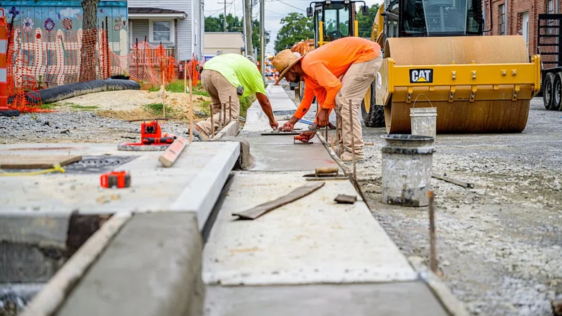At one point midway through yesterday's Brookings Institution forum on metropolitan planning, moderator Chris Leinberger
quipped that Portland was deliberately not represented. It's not that
Portland isn't a model of sustainability, he explained, but that "we
all have Portland fatigue" -- that urban policy thinkers are eager to
expand the models of local development beyond Oregon.
 The Uptown development in Oakland, cited as a success story yesterday. (Photo: SF Chronicle)
The Uptown development in Oakland, cited as a success story yesterday. (Photo: SF Chronicle)And
the forum fulfilled that objective. Planners from Salt Lake City, the
Twin Cities of Minnesota, and Sacramento's Area Council of Governments
(SACOG) shared successes and setbacks while attempting to forge a way
forward for Washington's often uncertain relationship with metropolitan
planning organizations (MPOs).
Leinberger, an experienced land use strategist, described the core question as: "What kind of built environment do we want? Over the past 50
years, it has been imposed by a bureaucracy, either in D.C. or by the
state capitals."
But
as more planners and local residents come to the (non-partisan)
conclusion that "it's time to be conscious about what kind of
development our transportation choices spark," as Leinberger put it,
what can the federal government do to help local success go national?
Michael
McKeever, executive director of the SACOG, and Peter McLaughlin, a
commissioner of Minnesota's Hennepin County, agreed that the upcoming
congressional climate change bill is essential to achieving land use reform.
If
the climate bill "does some fairly simple things and requires ... high
quality [MPO planning] to be done as a pre-condition of getting federal
funds," local development can become a more transparent and rational
process, McKeever said.
He warned, however, that the
legislation should not "go so far as mandating, 'these are exactly the
kinds of savings you should achieve" in terms of reductions in carbon
emissions and congestion. "I think, if localities are required to do
that kind of high-quality planning, they'll figure it out on their own
terms."
In fact, language to that effect was included in both the House and Senate
climate bills. How much aid Washington would provide to help MPOs
become more environmentally aware remains to be seen, though; the
Senate's first climate draft has restored language stricken from the
House bill that sets up a grant program to help MPOs, but the
provision's fate in the House leaves it at risk of falling out of the
Senate measure.
Without using the phrase "grant
program," McKeever underscored the importance of incentivizing changes
to MPO decision-making by funneling less federal money through state
DOTs.
"If some reasonable pot of money is given out based
on performance, not some kind of a fair-share formula," MPOs will
respond, he said, quipping: We are easy to bribe ... chasing money is a
non-partisan American value."
McLaughlin, who played a key role in the construction of the Twin Cities' Hiawatha rail line, offered similar recommendations. The funding that is headed for
the Obama administration's nascent sustainable communities office
"needs to be not only for planning, but for supplementary investments
as well," he said.
McLaughlin also pointed to several
transportation policy reforms that were included in the current
long-term House infrastructure bill, which has stalled amid intramural disputes
-- among them, more flexibility for local governments to spend highway
money on transit projects and greater support for public-private
partnerships.
But of course, he was most concerned with
the climate bill: "We've gotta get into the [legislation] more money,
to not only invest in the planning side of this but to fund the basic
transit infrastructure."
Without "a major contribution in
the [climate] bill," McLaughlin added, there won't be enough federal
funding to support needed new transit investments.
Fortunately, that climate bill is poised to get its first airing in the Senate in less than two weeks...




